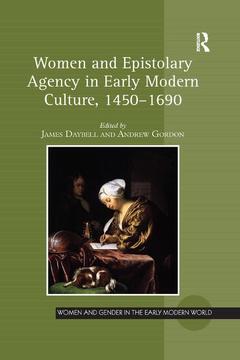Description
Women and Epistolary Agency in Early Modern Culture, 1450–1690
Women and Gender in the Early Modern World Series
Coordinators: Daybell James, Gordon Andrew
Language: English
Keywords
womens; letters; autograph; letter; scribal; writers; margaret; fell; writing; Young Man; anne; Early Modern Letters; Thomas Phelippes; Early Modern Women's Letters; Lady Anne Bacon; Early Quaker; Women’s Letters; Magdalen Hall; Sensitive Information; Scribal Letter; Lady Ranelagh; Epistolary Agency; Jane Grey; Early Modern Letter Writing; Margaret Fell; Early Modern Correspondence; James Daybell; Women’s Correspondence; Early Modern; Walsingham House; MIT Library; Swarthmoor Hall; Itinerant Ministers; Thos Things; Lady Penelope Rich
Publication date: 12-2019
· 15.6x23.4 cm · Paperback
Publication date: 06-2016
· 15.6x23.4 cm · Hardback
Description
/li>Contents
/li>Biography
/li>
Women and Epistolary Agency in Early Modern Culture, 1450?1690 is the first collection to examine the gendered nature of women?s letter-writing in England and Ireland from the late-fifteenth century through to the Restoration. The essays collected here represent an important body of new work by a group of international scholars who together look to reorient the study of women?s letters in the contexts of early modern culture. The volume builds upon recent approaches to the letter, both rhetorical and material, that have the power to transform the ways in which we understand, study and situate early modern women?s letter-writing, challenging misconceptions of women?s letters as intrinsically private, domestic and apolitical. The essays in the volume embrace a range of interdisciplinary approaches: historical, literary, palaeographic, linguistic, material and gender-based. Contributors deal with a variety of issues related to early modern women?s correspondence in England and Ireland. These include women?s rhetorical and persuasive skills and the importance of gendered epistolary strategies; gender and the materiality of the letter as a physical form; female agency, education, knowledge and power; epistolary networks and communication technologies. In this volume, the study of women?s letters is not confined to writings by women; contributors here examine not only the collaborative nature of some letter-writing but also explore how men addressed women in their correspondence as well as some rich examples of how women were constructed in and through the letters of men. As a whole, the book stands as a valuable reassessment of the complex gendered nature of early modern women?s correspondence.
Contents: Living letters: the subject and object of women’s correspondence, James Daybell and Andrew Gordon. Objects of Study: Constructing Women’s Letters:What they wrote: early Tudor aristocratic women, 1450-1550, Barbara J. Harris;By the queen: collaborative authorship in scribal correspondence of Queen Elizabeth I, Melanie Evans; The materiality of early modern women’s letters, James Daybell. Voices of Authority: Letters of Counsel and Advice:Women as counsellors in 16th-century England: the letters of Lady Anne Bacon and Lady Elizabeth Russell, Gemma Allen; The rhetoric of medical authority in Lady Katherine Ranelagh’s Letters, Michelle DiMeo; John Evelyn, Elizabeth Carey, and the trials of pious friendship, Cedric Brown; ‘Be plyeabell to all good Counsell’: Lady Brilliana Harley’s advice letter to her son, Johanna Harris Tyler. Networks and Negotiations: The Social Relations of Correspondence:Making friends with Elizabeth in the letters of Roger Ascham, Rachel McGregor; Irish women’s letters, 1641-1653, Marie-Louise Coolahan; Recovering agency in the epistolary traffic of Frances, Countess of Essex and Jane Daniell, Andrew Gordon; Quaker correspondence: religious identity and communication networks in the interregnum Atlantic world’, Marjon Ames. Postscript:New directions in early modern women’s letters: WEMLO’s challenges and possibilities, Kim McLean-Fiander and James Daybell; Notes; Bibliography; Index.
James Daybell is Professor of early modern British history at Plymouth University, UK.
Andrew Gordon is Senior Lecturer in English at the University of Aberdeen, UK.




